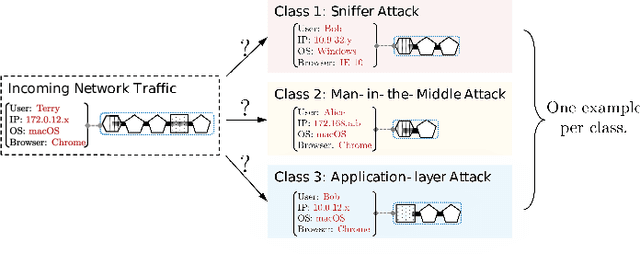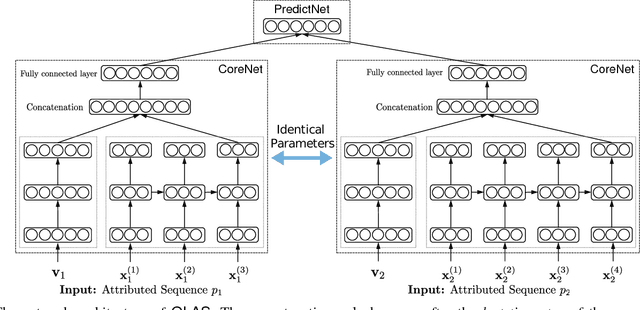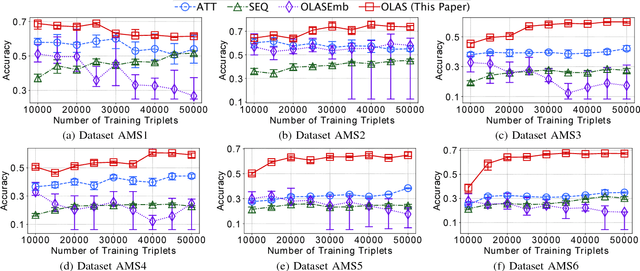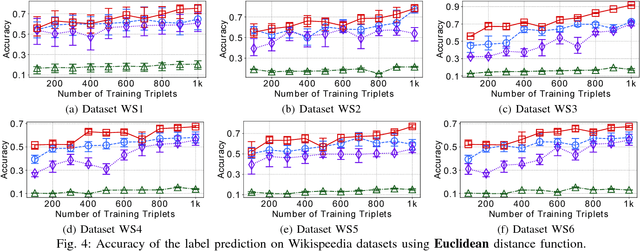Jihane Zouaoui
One-Shot Learning on Attributed Sequences
Jan 23, 2022



Abstract:One-shot learning has become an important research topic in the last decade with many real-world applications. The goal of one-shot learning is to classify unlabeled instances when there is only one labeled example per class. Conventional problem setting of one-shot learning mainly focuses on the data that is already in feature space (such as images). However, the data instances in real-world applications are often more complex and feature vectors may not be available. In this paper, we study the problem of one-shot learning on attributed sequences, where each instance is composed of a set of attributes (e.g., user profile) and a sequence of categorical items (e.g., clickstream). This problem is important for a variety of real-world applications ranging from fraud prevention to network intrusion detection. This problem is more challenging than conventional one-shot learning since there are dependencies between attributes and sequences. We design a deep learning framework OLAS to tackle this problem. The proposed OLAS utilizes a twin network to generalize the features from pairwise attributed sequence examples. Empirical results on real-world datasets demonstrate the proposed OLAS can outperform the state-of-the-art methods under a rich variety of parameter settings.
MLAS: Metric Learning on Attributed Sequences
Nov 08, 2020



Abstract:Distance metric learning has attracted much attention in recent years, where the goal is to learn a distance metric based on user feedback. Conventional approaches to metric learning mainly focus on learning the Mahalanobis distance metric on data attributes. Recent research on metric learning has been extended to sequential data, where we only have structural information in the sequences, but no attribute is available. However, real-world applications often involve attributed sequence data (e.g., clickstreams), where each instance consists of not only a set of attributes (e.g., user session context) but also a sequence of categorical items (e.g., user actions). In this paper, we study the problem of metric learning on attributed sequences. Unlike previous work on metric learning, we now need to go beyond the Mahalanobis distance metric in the attribute feature space while also incorporating the structural information in sequences. We propose a deep learning framework, called MLAS (Metric Learning on Attributed Sequences), to learn a distance metric that effectively measures dissimilarities between attributed sequences. Empirical results on real-world datasets demonstrate that the proposed MLAS framework significantly improves the performance of metric learning compared to state-of-the-art methods on attributed sequences.
Attributed Sequence Embedding
Nov 03, 2019



Abstract:Mining tasks over sequential data, such as clickstreams and gene sequences, require a careful design of embeddings usable by learning algorithms. Recent research in feature learning has been extended to sequential data, where each instance consists of a sequence of heterogeneous items with a variable length. However, many real-world applications often involve attributed sequences, where each instance is composed of both a sequence of categorical items and a set of attributes. In this paper, we study this new problem of attributed sequence embedding, where the goal is to learn the representations of attributed sequences in an unsupervised fashion. This problem is core to many important data mining tasks ranging from user behavior analysis to the clustering of gene sequences. This problem is challenging due to the dependencies between sequences and their associated attributes. We propose a deep multimodal learning framework, called NAS, to produce embeddings of attributed sequences. The embeddings are task independent and can be used on various mining tasks of attributed sequences. We demonstrate the effectiveness of our embeddings of attributed sequences in various unsupervised learning tasks on real-world datasets.
 Add to Chrome
Add to Chrome Add to Firefox
Add to Firefox Add to Edge
Add to Edge